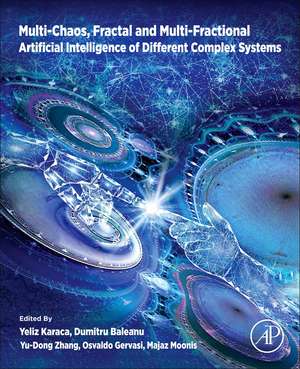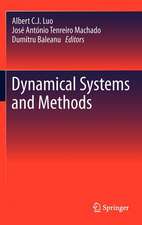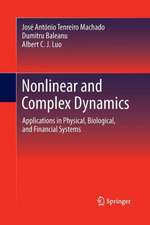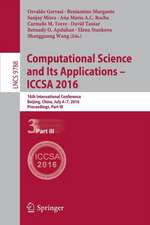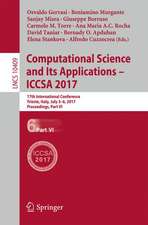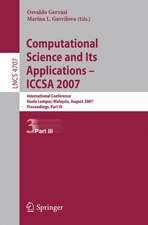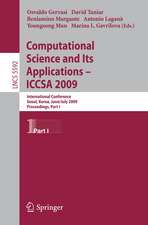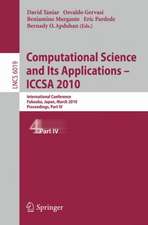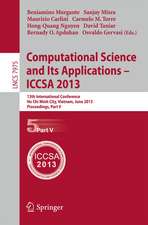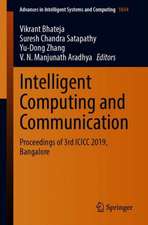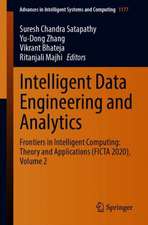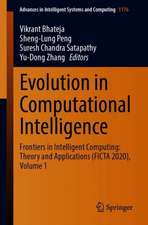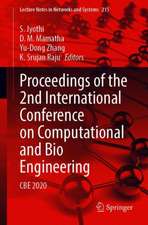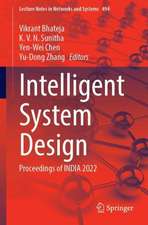Multi-Chaos, Fractal and Multi-Fractional Artificial Intelligence of Different Complex Systems
Editat de Yeliz Karaca, Dumitru Baleanu, Yu-Dong Zhang, Osvaldo Gervasi, Majaz Moonisen Limba Engleză Paperback – 23 iun 2022
- Constructs and presents a multifarious approach for critical decision-making processes embodying paradoxes and uncertainty.
- Includes a combination of theory and applications with regard to multi-chaos, fractal and multi-fractional as well as AI of different complex systems and many-body systems.
- Provides readers with a bridge between application of advanced computational mathematical methods and AI based on comprehensive analyses and broad theories.
Preț: 843.74 lei
Preț vechi: 1055.08 lei
-20% Nou
Puncte Express: 1266
Preț estimativ în valută:
161.47€ • 165.36$ • 134.32£
161.47€ • 165.36$ • 134.32£
Carte tipărită la comandă
Livrare economică 12-26 martie
Preluare comenzi: 021 569.72.76
Specificații
ISBN-13: 9780323900324
ISBN-10: 0323900321
Pagini: 350
Ilustrații: 70 illustrations (20 in full color)
Dimensiuni: 216 x 276 mm
Greutate: 0.82 kg
Editura: ELSEVIER SCIENCE
ISBN-10: 0323900321
Pagini: 350
Ilustrații: 70 illustrations (20 in full color)
Dimensiuni: 216 x 276 mm
Greutate: 0.82 kg
Editura: ELSEVIER SCIENCE
Cuprins
1. Introduction
Yeliz Karaca and Dumitru Baleanu
2. Theory of Complexity, Origin and Complex Systems
Yeliz Karaca
3. Multi-chaos, Fractal and Multi-fractional AI in Different Complex Systems
Yeliz Karaca
4. High Performance Computing and Computational Intelligence Applications with Multi-Chaos Perspective
Osvaldo Gervasi, Damiano Perri, Marco Simonetti, and Sergio Tasso
5. Human Hypercomplexity: Error and Unpredictability in Complex Multi-Chaotic Social Systems
Piero Dominici Sr.
6. Multifractal Complexity Analysis-based Dynamic Media Text Categorization Models by Natural Language Processing with BERT
Yeliz Karaca, Yu-Dong Zhang, Ahu Dereli Dursun, and Shui-Hua Wang
7. Mittag-Leffler Functions with Heavy-tailed Distributions’ Algorithm based on Different Biology Datasets to be Fit for Optimum Mathematical Models’ Strategies
Dumitru Baleanu and Yeliz Karaca
8. Artificial Neural Network Modeling of Systems Biology Datasets Fit Based on Mittag-Leffler Functions with Heavy-tailed Distributions for Diagnostic and Predictive Precision Medicine
Yeliz Karaca and Dumitru Baleanu
9. Computational Fractional-Order Calculus and Classical Calculus AI for Comparative Differentiability Prediction Analyses of Complex-systems-grounded Paradigm
Yeliz Karaca and Dumitru Baleanu
10. Pattern Formation Induced by Fractional-order Diffusive Model of COVID-19
Yeliz Karaca and Naveed Iqbal
11. Prony’s series in time and frequency domains and relevant fractional models
Jordan Hristov
12. A chain of kinetic equations of Bogoliubov-Born-Green-Kirkwood-Yvon and its application to non-equilibrium complex systems
Mukhayo Rasulova V, Tohir Vohidovich Akramov, Nicolai (Jr) Bogoliubov, and Umarbek Avazov
13. Hearing Loss Detection in Complex Setting by Stationary Wavelet Rényi Entropy and Three-Segment Biogeography-Based Optimization
Yabei Li, Junding Sun, and Chong Yao
14. Shannon Entropy-based Complexity Quantification of Nonlinear Stochastic Process: Diagnostic and Predictive Spatio-temporal Uncertainty of Multiple Sclerosis Subgroups
Yeliz Karaca, and Majaz Moonis
15. Chest X-ray image detection for pneumonia via complex convolutional neural network and Biogeography-based optimization
Junding Sun, Xiang Li, and Mengyao Zhai
16. Complex facial expression recognition via Densenet-121
Bin Li
17. Quantitative assessment of local warming based on urban dynamics using remote sensing techniques.
Valentina Santarsiero, Lucia Saganeiti, Angela Pilogallo, Francesco Scorza, Beniamino Murgante, Valentina Santarsiero, and Gabriele Nolè
18. Managing Information Security risk and Internet of Things (IoT) Impact on Challenges of Medicinal Problems with Complex Settings: A Complete Systematic Approach
N. Thirupathi Rao, Debnath Bhattacharyya, and Eali Stephen Neal Joshua
19. An Extensive Discussion on Utilization of Data Security and Big Data Models for Resolving Healthcare Problems
N. Thirupathi Rao, Debnath Bhattacharyya, and Eali Stephen Neal Joshua
Yeliz Karaca and Dumitru Baleanu
2. Theory of Complexity, Origin and Complex Systems
Yeliz Karaca
3. Multi-chaos, Fractal and Multi-fractional AI in Different Complex Systems
Yeliz Karaca
4. High Performance Computing and Computational Intelligence Applications with Multi-Chaos Perspective
Osvaldo Gervasi, Damiano Perri, Marco Simonetti, and Sergio Tasso
5. Human Hypercomplexity: Error and Unpredictability in Complex Multi-Chaotic Social Systems
Piero Dominici Sr.
6. Multifractal Complexity Analysis-based Dynamic Media Text Categorization Models by Natural Language Processing with BERT
Yeliz Karaca, Yu-Dong Zhang, Ahu Dereli Dursun, and Shui-Hua Wang
7. Mittag-Leffler Functions with Heavy-tailed Distributions’ Algorithm based on Different Biology Datasets to be Fit for Optimum Mathematical Models’ Strategies
Dumitru Baleanu and Yeliz Karaca
8. Artificial Neural Network Modeling of Systems Biology Datasets Fit Based on Mittag-Leffler Functions with Heavy-tailed Distributions for Diagnostic and Predictive Precision Medicine
Yeliz Karaca and Dumitru Baleanu
9. Computational Fractional-Order Calculus and Classical Calculus AI for Comparative Differentiability Prediction Analyses of Complex-systems-grounded Paradigm
Yeliz Karaca and Dumitru Baleanu
10. Pattern Formation Induced by Fractional-order Diffusive Model of COVID-19
Yeliz Karaca and Naveed Iqbal
11. Prony’s series in time and frequency domains and relevant fractional models
Jordan Hristov
12. A chain of kinetic equations of Bogoliubov-Born-Green-Kirkwood-Yvon and its application to non-equilibrium complex systems
Mukhayo Rasulova V, Tohir Vohidovich Akramov, Nicolai (Jr) Bogoliubov, and Umarbek Avazov
13. Hearing Loss Detection in Complex Setting by Stationary Wavelet Rényi Entropy and Three-Segment Biogeography-Based Optimization
Yabei Li, Junding Sun, and Chong Yao
14. Shannon Entropy-based Complexity Quantification of Nonlinear Stochastic Process: Diagnostic and Predictive Spatio-temporal Uncertainty of Multiple Sclerosis Subgroups
Yeliz Karaca, and Majaz Moonis
15. Chest X-ray image detection for pneumonia via complex convolutional neural network and Biogeography-based optimization
Junding Sun, Xiang Li, and Mengyao Zhai
16. Complex facial expression recognition via Densenet-121
Bin Li
17. Quantitative assessment of local warming based on urban dynamics using remote sensing techniques.
Valentina Santarsiero, Lucia Saganeiti, Angela Pilogallo, Francesco Scorza, Beniamino Murgante, Valentina Santarsiero, and Gabriele Nolè
18. Managing Information Security risk and Internet of Things (IoT) Impact on Challenges of Medicinal Problems with Complex Settings: A Complete Systematic Approach
N. Thirupathi Rao, Debnath Bhattacharyya, and Eali Stephen Neal Joshua
19. An Extensive Discussion on Utilization of Data Security and Big Data Models for Resolving Healthcare Problems
N. Thirupathi Rao, Debnath Bhattacharyya, and Eali Stephen Neal Joshua
